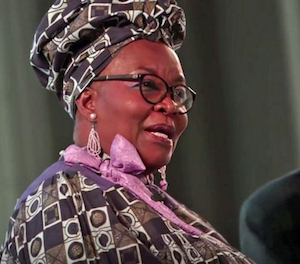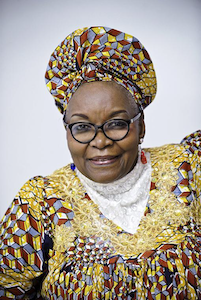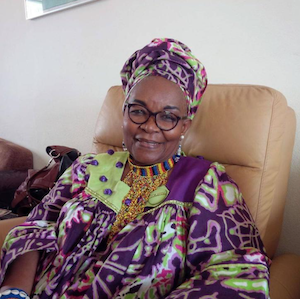
Alice Nkom was born on January 14, 1945 in Poutkak, Cameroon to Martin Nkom Bayi and Alice Ngo Bikang, and grew up with ten siblings. From the beginning, Alice Nkom broke barriers in Cameroon. After attending the University of Toulouse in France from 1963 to 1964, Alice pursued higher education at the Federal University of Cameroon in 1968. At the remarkable age of 24, Alice Nkom became the first female attorney in Douala, the largest city in Cameroon, entering a male-dominated industry and inspiring others who are following her path. Alice Nkom’s early history in her law career was dedicated to advocating for “low income and vulnerable people, including political prisoners, street children, and women.”

Her career started to take a crucial turn in the early 2000’s, when Nkom saw the injustice LGBTQ+ people were facing, where they could be sentenced to 5 years of jail time for their identities. Laws in Cameroon have allowed the mistreatment of the LGBTQ+ community to go unnoticed with no consequences for the country’s blatant violation of human rights. “Police told us we are devils, not humans, not normal. They beat a trans woman in the face, slapped her twice in front of me,” said a transgender Cameroonian woman in her 20’s. Furthermore, police have a long history of mass arrests, forced anal examinations, and HIV tests on members of the LGBTQ+ community, including teenagers and young adults.
Noticing the corruption, Nkom jumped to action in 2003, founding the first anti-homophobic non-profit organization in Cameroon called The Association for the Defence of Homosexual Rights, also known as ADEFHO. Although such an organization exists, it was difficult to get young LGBTQ+ members involved, as they feared prosecution, abuse, or worse. Nkom’s most well-known case occurred in 2005 when she defended the Yaounde 11, which was a group of men who had been arrested for charges of homosexuality in Cameroon’s capital city. The group ended up spending one year in jail. Thankfully, the case garnered national attention with the United Nations calling it a human rights violation.

As impactful as her work has been, Nkom has faced many obstacles and people who criticize her values and stated that “at one point, I was receiving threatening phone calls one day and night. They called me a witch, they said I was inciting children to ‘get their asses smashed’... It was very violent. I became the person to avoid. These people thought they could forbid me to speak out for anyone I wanted.” One Cameroonian lawyer even went as far as saying that she should be put to death for “encouraging homosexuality” on television, citing the Bible as his justification. In 2007, the Minister of Justice attempted to file a complaint against Nkom, as “justification of a crime” after an interview she held on the radio criticizing homophobic laws. Luckily, it did not result in a conviction or punishment. In 2011, Nkom was formally threatened with imprisonment by the Ministry of Communication of Cameroon, since the European Union had granted ADEFHO a €300,000 grant.
Even though Nkom has encountered and continues to experience opposition for her work, she hasn’t stopped fighting. She was the keynote speaker at the Human Rights conferences in 2006 and 2013 in Canada and Belgium. She was also awarded the 7th Human Rights Award by the German section of Amnesty International.
At the age of 77, Alice Nkom still continues to fight for LGBTQIA+ people across Cameroon and represents them in a country where the law punishes them for simply existing. She updates her Twitter regularly and highlights the stories of those who need a voice.
Why Did I Choose to Research Alice Nkom?
When I first learned about Alice Nkom, her impact on me can be summed up in one word: inspired. Her story and tales of perseverance, even with all the hardship she went through, are amazing. Activism is something I am very passionate about, especially when it concerns the LGBTQ+ community, so seeing someone who continuously seeks to uplift others in an intolerant country motivates me to do more for my community. After reading her story, I can confidently say that I view Alice Nkom as a role model and someone who I aspire to be like. She’s strong, courageous, and isn’t afraid to speak up for what she believes in.
Works Cited
Anders, contributed by: Tisa M. “Alice Nkom (1945- ) BLACKPAST.” BLACKPAST, 16 Feb. 2020, https://www.blackpast.org/global-african-history/nkom-alice-1945/.
“Alice NKOM: Fighting for the Rights of LGBT People in Cameroon.” GLAAD, 15 Mar. 2012, https://www.glaad.org/blog/alice-nkom-fighting-rights-lgbt-people-cameroon.
“Pioneer African Women in Law.” African Women in Law, https://www.africanwomeninlaw.com/african-women-in-law/Alice-Nkom.
MAKOOI, Bahar. “Alice Nkom, Cameroon's Tireless Defender of LGBTQ Rights.” France 24, 8 Oct. 2021, https://www.france24.com/en/africa/20211008-alice-nkom-cameroon-s-tireless-defender-of-lgbtq-rights.
“Cameroon: Wave of Arrests, Abuse against LGBT People.” Human Rights Watch, 14 Apr. 2021, https://www.hrw.org/news/2021/04/14/cameroon-wave-arrests-abuse-against-lgbt-people.
This article was published on 2/17/23